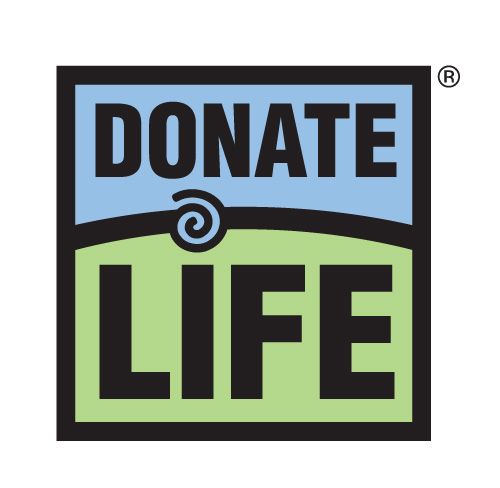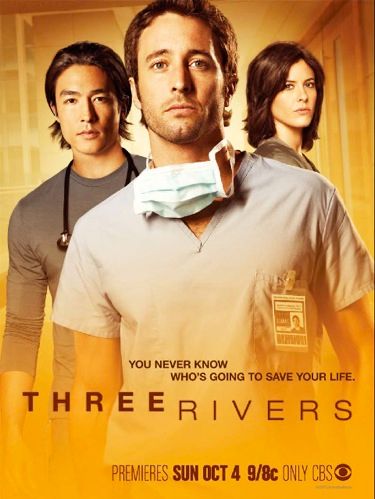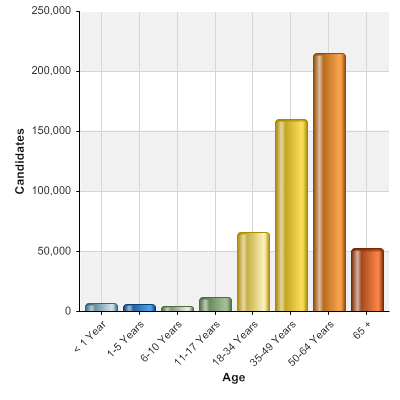
Medical shows are a generational television staple—often dramatic, rarely realistic, and only sometimes socially relevant. But tonight, on CBS, a different kind of medical show premiered. Three Rivers, based at a fictional world-famous transplant hospital in Pittsburgh, puts front and center an often misunderstood and ignored sector of modern medicine—organ transplantation. With wit, sensitivity, and a refreshing degree of accuracy, this important new show will shed light on the three branches of the organ donation and transplantation system: the donors, the recipients, and the transplant surgeons and staff who connect the two. Under the jump, ScriptPhD.com reviews the pilot and provides important information and resources for those who are considering signing up to be a donor.
Review: “Three Rivers” (CBS)

The characters and setup will seem familiar to anyone who watches medical shows on a regular basis. There is Dr. Andy Yablonski, the dashing, brilliant, yet arrogant surgeon who is too busy saving lives to be concerned with the boring details of being a doctor (Alex O’Loughlin). Dr. Miranda Foster (Katherine Moening) is as damaged as she is earnest, and lives and dies with each patient she will save. The hospital’s shiny new transplant coordinator Ryan Abbott (Christopher Hanke) is learning the details of transplantation on the job, and so is the audience along with him (nice touch!). Tethering this crew is the matronly, austere hospital administrator Dr. Sophia Jordan (Alfre Woodard). Unfamiliar, and exposed on television for the first time, is the tense pressure-cooker setting in which these doctors perform their job: a nationally renowned transplant center, Three Rivers Hospital. The organs are what interconnect seemingly discordant lives—a workplace accident in Cleveland, a pregnant patient experiencing heart failure in Pittsburgh and an African who traveled the world in search of the best transplant care—and the heroic doctors, and generous families are what make it all possible. Medical shows have certainly broached organ transplantation before, but Three Rivers takes it one step further to present a real-time tapestry of the complex players and paths that must come together to pull off what is quite an impressive feat. The show is fast-paced, innovative, and written cleverly enough to allow forgiveness of divergence into occasional tired cliché territory.
What they got right…
A lot, actually. The devil’s in the details (especially in television dialogue), and Three Rivers surprises and delights with how many they expertly weaved in to the overarching storylines. Some were throwaway, yet crucial—Dr. Yablonski using Purell on his hands before touching a (likely immunocompromised) patient. Also noteworthy were certain facts, myths and misconceptions about donation sprinkled in throughout the pilot (103,000 patients currently on the waiting list). The Three Rivers writing staff just needs to mind that they continue to incorporate them into the storylines, lest they risk sounding overly preachy or didactic. Others were more overt, such as how quickly difficult decisions must be made when an organ is at stake. The husband who must decide on a C-section versus a transplant for his wife would indeed have only hours, maximum, to make the choice before transplant doctors moved on to the next patient on the waiting list. Finally, and most importantly to the show’s greater thematic ambitions, Three Rivers provides a delicate balance to not undermining the tragedy of the victims (donors) in exchange for celebrating the lives they will eventually save (the recipients).
Missteps…
My two biggest problems with the pilot were in the hospital presentation and rosy picture of organ availability and mobility. I don’t know how often the writers of this show have visited hospitals in the United States, even the modern, new ones, but they don’t look remotely like the fictional “Three Rivers”. Surrounded by glass and neo-modern angular architecture, this hospital spares no expenses in the technology department: magical touch-screens in every conference room, three-dimensional mobile radiology lab results, and 1,000 channels in every patient’s room. Someone needs to tell President Obama about this wizardry; it could really change the universal health care debate in this country! Secondly, the show takes some loose liberties with how quick of a turnaround transplant patients can expect when they walk into a hospital, and which patients can expect to get organs. Dr. Yablonski grins as he promises his African patient a new heart, despite no insurance coverage and magically procures a heart at will for a pregnant patient. The truth is that all the good intentions in the world can’t supersede or bypass the strict, immutable guidelines established by the United Network for Organ Sharing, the official arbiter of the nation’s organ waiting list that facilitates every organ transplant performed in the United States. Yes, the wealthy, the connected, and special snowflakes like Steve Jobs can often massage the system to bypass spots on the national queue, something that has stirred passionate debate about the true equity of the system, but by and large, a patient’s spot on the list, and their mobility within it, is determined by factors such as direness of illness, length of wait, and, yes, regional location. Unfortunately, even in the most critical circumstances, the sickest patients die every day waiting for an available organ, another great reason to become a donor today (see below). It is my hope that, while uncomfortable, future episodes will address this sad reality.
Despite these minor quibbles, the ScriptPhD is delighted to see a television show entertain, educate, and strive to embed consciousness towards, and give a compassionate face to, organ donation. It is highly likely that this television show will save thousands of lives simply by telling these stories and motivating viewers to become donors and talk about it with their extended families and friends, and that is a priceless dividend for art transcending life.
Three Rivers airs on Sundays at 9 PM ET/PST on CBS.
The Gift of Life
In an unusual degree of social outreach for a television show, CBS and Three Rivers are partnering with Donate Life America, an educational vehicle of the medical transplant community established in 1992. “We have been working with Donate Life to ensure ‘Three Rivers’ accuracy,” said executive producer/creator Carol Barbee. “We are hoping that the awareness from our show and the outreach from the combined efforts of CBS and Donate Life will result in an increase in donor registration which in turn will save lives.” In addition to council on technical aspects of the show’s content, a widespread organ donor awareness campaign by CBS will include green donor bracelets and literature at various studio properties to live audiences, a donation campaign at DMV locations throughout the country, and special public service announcements involving stars from the show. Donate Life is actively involved in digital social media outreach, and you can follow them on their Facebook page and various Twitter discussions (#DonateLife).

Currently, over 103,977 men, women and children await life-saving organ transplants (as of October 1, 2009). Complicating the efforts of physicians, health care providers and transplant organizations to raise awareness and giving are misconceptions and outright fallacies about the donation process, patient qualifications and religious and moral considerations to donation. Some of these include:
Financial cost: There is no financial cost associated with becoming an organ donor. If you are a recipient, there are several common funding sources for financing a transplant that may be found here.
Religious objection: All major religions either accept organ donation or the right of the individual to choose to donate. If you are conflicted, talk to your clergymember about the issues involved and set your mind and heart at ease that the important decision you are making falls in line with your spiritual and religious views and obligations.
Age restrictions: There are none. The only qualification on organ donation (living or deceased) is health, not age. If you sign up to be an organ donor, the transplant doctors will decide whether you qualify. Qualifications for living donors may be found here.
Signing up is complicated: Quite the opposite. In most cases, it’s as easy as signing a donor card, DMV permission form, or finding out how to be a living donor through the United Network for Organ Sharing.
And this is a big one…
Doctors will not try as hard to save the life of an organ donor: This commonly propagated piece of misinformation is simply NOT TRUE. Doctors who treat patients at the time of illness or death are not involved in either obtaining consent for organ donation or the transplantation itself (this is handled by a different team of surgeons). As such, every effort is made to save the life of every patient, regardless of donor status.
To help address some of the topics we’ve broached, and provide many more detailed answers for potential donors, recipients and their loved ones, please visit some of these important organ (and blood and bone marrow) donation agencies and organizations:
•United Network for Organ Sharing (UNOS), the official transplant recipient waiting list organization
•Donate Life America
•OrganDonor.gov, the official U.S. Government page on organ donation and awareness facts
•Transplant Living, the official resource page for transplant patients and living transplant donors (non-deceased donors).
•American Society of Transplantation, the research and medical professional association of transplant specialists.
•My Angel Foundation, providing support and inspiration to recipients and donors, as well as their families.
•National Bone Marrow Registry Are you registered to be a bone marrow donor? It’s easy, relatively risk-free, and you could save a life today.
•GiveLife.org Find a blood drive near
you through your local Red Cross.
To find out how to become an organ donor, click on your state for detailed information. Simply marking “yes” on your driver’s license is not enough in some cases to be considered a donor. You can also download and sign organ donor cards to carry with you in your wallet.
Ultimately, the decision to become an organ donor can be summed up with a poignant line from the Three Rivers pilot: “It has to be a gift.” It is one of the most personal, heart-wrenching, difficult decisions an individual can make, and one that is often asked of families under pressured, stressful, confusing circumstances. But this does not have to be so. Have those discussions with your loved ones and make your wishes clearly known now. And if you need some added inspiration about how much the gift of life can live on in those that receive transplants and make a difference to the families of those that give, check out some of these inspiring stories and a video of a heart transplant recipient’s letter to her donor. ScriptPhD.com humbly asks you to please peruse the links we have provided to consider if organ donation—the gift of life—might be the right decision for you and your family.
~*ScriptPhD*~
*****************
Follow ScriptPhD.com on Twitter and our Facebook page. Subscribe to email alerts for new posts on our home page.